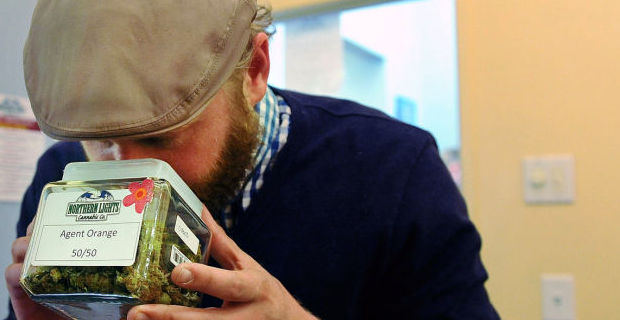Washington’s weed dilemma: The grass is greener in Colorado
David Temple, of Dallas, smells a variety of marijuana called Agent Orange at the Northern Lights Cannabis Co. in Edgewater near Denver, Colo., Jan. 24, 2014.
July 16, 2014
Washington’s first pot shops opened this month in disorder and chaos.
Colorado opened its first pot shops at the start of the New Year, nearly seven months before Washington. And although our state will eventually profit from selling pot, that won’t happen anytime soon thanks to the inefficient and disorganized nature of the state’s law.
Colorado has reaped the economic benefits of selling pot and has received $1.2 million in tax revenue since it started, NBC reported. Washington just opened its shops and is already struggling with supply.
Simply put, Colorado has a much better system in place for a few reasons.
Colorado allows entrepreneurs to make and sell cannabis, while Washington requires a strict separation between growers, processors and retailers. Alcohol is handled the same way, but this system hinders the production and sale of pot much more.
Colorado allows 12 cannabis plants per household, simply integrating home growing into their market. Washington strictly forbids any home growing. So when the state struggles with supply, no weed is technically legal.
Zoning laws leave little room for pot shops to be located. Colorado requires distance between schools, drug treatment centers and other pot shops. Washington has a much longer list including parks, libraries, arcades and transit centers.
Finally, the day before pot shops opened in Washington, NBC reported there were 18 reviewers who had been sifting through thousands of applications to legally sell pot. Due to this, even though some shops have been created and established, many are not able to open thanks to inefficient bureaucracy.
All this adds up to what Mark Kleiman, a UCLA professor of public policy, said is “probably the second worst” way to treat cannabis policy.
To be fair, Washington has better growing laws which allow pot to be grown outside and inside, as opposed to Colorado’s inside-only rule. Additionally, the requirements for a person who wants to open a shop are much lower in Washington. They include a three month residency with a small fee in the hundreds versus Colorado’s larger entry fees and longer residency rules.
Business owners who have been trying to cash in on the new industry have reported frustrations and disappointment over the law. Washingtonian Ed Rhinehart is one of them.
“If I had to do it all over again, I wouldn’t,” Rhinehart told NBC.
However, comparing them side-by-side given the current state of affairs, there really is no comparison as to which state has been more successful. Washington has been bogged down by inefficiencies as it has tried to get its pot industry up and running.
Washington has handled the process poorly. It is disappointing considering that the more quickly the industry is established, the more quickly Washington could reap the benefits.
The majority of Washington voters wanted to make pot legal. While their wish has come true, the ugly truth behind Washington’s policies hinders the potential of legal cannabis.






















